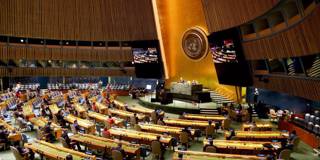 Selcuk Acar/NurPhoto via Getty Images
Selcuk Acar/NurPhoto via Getty Images
庆祝联合国成立75周年
纽约—正当联合国成立75周年,世界正处于动荡之中。至今,新冠肺炎疫情已经导致100万人的死亡,世界经济正经历1930年代大萧条以来最大的萧条。从洪水到荒野大火等其他重大的自然灾害正在一些国家肆虐。作为世界促进国与国关系合作的积极倡议的美国,也正在拒绝甚至对抗从前的朋友和合作伙伴。信奉全球团结的联合国的存在越发显得重要。
联合国的成立有三个支柱。第一是和平。当它的前世机构国际联盟日益衰败时,联合国才渐渐胜出。国际联盟没有阻止另外一场世界大战。联合国成立在冷战的前夕,他的成立成为国家和平保证的重要力量。
第二个支柱是人权。1948年,联合国安理会通过了《全球人权宣言》,第一次提出人的基本权利包括公民权,政治权,经济社会和文化权利等方面。所有的国家都要遵守。虽然联合国的机制在保证这些权力上喜忧参半,不可置疑的是,全球人权宣言是实现各国人权的主要基石。
https://prosyn.org/WzDFg0jzh
To continue reading, register now. It’s free!
Register Now
Already have an account?
Log in



纽约—正当联合国成立75周年,世界正处于动荡之中。至今,新冠肺炎疫情已经导致100万人的死亡,世界经济正经历1930年代大萧条以来最大的萧条。从洪水到荒野大火等其他重大的自然灾害正在一些国家肆虐。作为世界促进国与国关系合作的积极倡议的美国,也正在拒绝甚至对抗从前的朋友和合作伙伴。信奉全球团结的联合国的存在越发显得重要。
联合国的成立有三个支柱。第一是和平。当它的前世机构国际联盟日益衰败时,联合国才渐渐胜出。国际联盟没有阻止另外一场世界大战。联合国成立在冷战的前夕,他的成立成为国家和平保证的重要力量。
第二个支柱是人权。1948年,联合国安理会通过了《全球人权宣言》,第一次提出人的基本权利包括公民权,政治权,经济社会和文化权利等方面。所有的国家都要遵守。虽然联合国的机制在保证这些权力上喜忧参半,不可置疑的是,全球人权宣言是实现各国人权的主要基石。